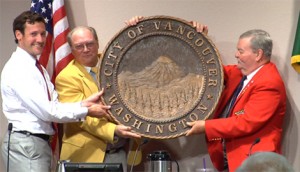Podcast: Download (Duration: 12:30 — 732.8KB)
Back in 1961, when retired Vancouver high school teacher Michael Harding was on the Columbia River High School swim team, he and his teammates practiced in a small, frigid swimming pool in the basement of what is now old city hall.
“It was terrible, but we came to find out that we swam better in the cold,” said Harding.
Fifty years later, Harding and a number of members of the honor society The Forty & Eight were on hand Monday night to commemorate the final public meeting in old city hall with a short ceremony that featured glimpses into Vancouver’s political past, as well as optimism surrounding the imminent move into new city hall.
Leavitt announced that city employees would finish moving into the new city hall, located at 415 W. Sixth St., by the end of the week. The city’s nearly 400 employees had worked out of five different buildings, four of which were leased.
The city bought the six-story, 118,000 square-foot building for $17.6 million, but the purchase of adjacent property and other contingencies pushed the project to $23 million.
“What this creates, obviously, is a one-stop shop,” Leavitt said.
As part of the ceremony to retire the council chambers, members of The Forty & Eight helped lower the circular metal seal mounted on the wall behind the council chairs and prepare it for transfer to the new council chambers. The Forty & Eight, then affiliated with the American Legion, donated the seal in 1991.
“It was our pleasure to have the opportunity to present it to the city,” said Bob Axland, who originally helped design the seal with fellow Forty & Eight member Paul Mason. Axland is a former Vancouver policeman who later retired as the administrator of the Clark County juvenile court.
Adding more history to the proceedings was retired Vancouver City Council member Pat Jollota, who served on the council from 1990 to 2010. She is writing a historical book about Vancouver, a process that has led her to discover some legendary political figures whose contributions lasted long after their notoriety faded.
Jollota offered the story of former Vancouver mayor Ralph Carter, who formed a consortium of community leaders in 1950 to prevent segregation in Vancouver. Jollota said Carter’s actions weren’t popular, but they were right – and it should be an example to the current council members.
“The decisions that we make, the decisions that I made, the decisions that other city council members long forgotten have made ripple down through the years,” said Jollata. “Don’t worry about your name going down in history. Do the thing that’s right.”










